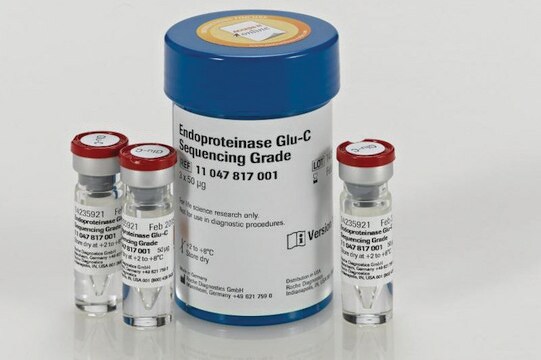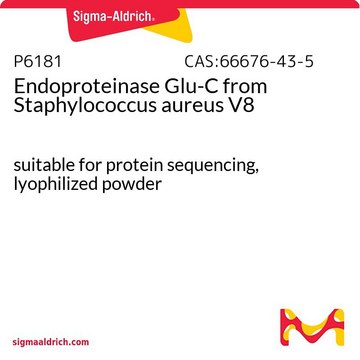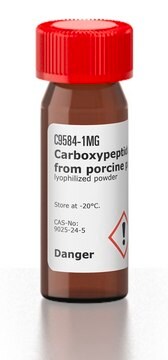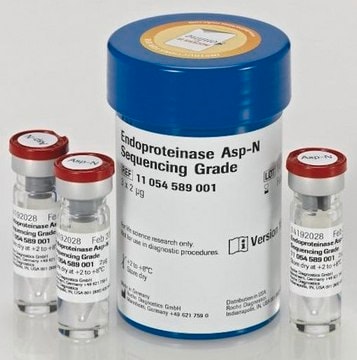324713
Endoproteinase Glu-C, Excision Grade, Staphylococcus aureus
Synonym(s):
Endoproteinase Glu-C, Excision Grade, Staphylococcus aureus, V8 Protease
Sign Into View Organizational & Contract Pricing
Select a Size
All Photos(1)
Select a Size
Change View
About This Item
CAS Number:
MDL number:
UNSPSC Code:
12352202
NACRES:
NA.54
Recommended Products
biological source
Staphylococcus aureus
Quality Level
grade
Proteomics Grade
form
lyophilized
specific activity
≥10 units/mg protein
manufacturer/tradename
Calbiochem®
storage condition
OK to freeze
shipped in
ambient
storage temp.
2-8°C
General description
Native endoproteinase Glu-C from Staphylococcus aureus. Serine protease that specifically hydrolyzes peptide bonds at the carboxylic side of glutamic acid and aspartic acid residues. Inhibited by DFP and α2-macroglobulin.
Native endoproteinase Glu-C from Staphylococcus aureus. Serine protease that specifically hydrolyzes peptide bonds at the carboxylic side of glutamic acid and aspartic acid residues. Inhibited by DFP and α2-macroglobulin. Suggested working concentration: 1:20 to 1:100 (protease:protein by weight) for sequence analysis.
Warning
Toxicity: Harmful (C)
Unit Definition
One unit is defined as the amount of enzyme that will hydrolyze 1.0 µmol Z-Phe-Leu-Glu-pNA per min at 25°C, pH 7.8.
Reconstitution
Following reconstitution, aliquot and freeze (-20°C) for long term storage or refrigerate (4°C) for short term storage. Stock solutions are stable for up to 2 days at 4°C or for up to 1 month at -20°C.
Other Notes
Houmard, J., and Drapeau, G.R. 1972. Proc. Natl. Acad. Sci. USA69, 3506.
Legal Information
CALBIOCHEM is a registered trademark of Merck KGaA, Darmstadt, Germany
Signal Word
Danger
Hazard Statements
Precautionary Statements
Hazard Classifications
Resp. Sens. 1 - Skin Sens. 1
Storage Class Code
11 - Combustible Solids
WGK
WGK 1
Flash Point(F)
Not applicable
Flash Point(C)
Not applicable
Certificates of Analysis (COA)
Search for Certificates of Analysis (COA) by entering the products Lot/Batch Number. Lot and Batch Numbers can be found on a product’s label following the words ‘Lot’ or ‘Batch’.
Already Own This Product?
Find documentation for the products that you have recently purchased in the Document Library.
Victoria L Stefanelli et al.
Matrix biology : journal of the International Society for Matrix Biology, 82, 86-104 (2019-04-21)
The extracellular matrix (ECM) microenvironment is increasingly implicated in the instruction of pathologically relevant cell behaviors, from aberrant transdifferentation to invasion and beyond. Indeed, pathologic ECMs possess a panoply of alterations that provide deleterious instructions to resident cells. Here we
Our team of scientists has experience in all areas of research including Life Science, Material Science, Chemical Synthesis, Chromatography, Analytical and many others.
Contact Technical Service








